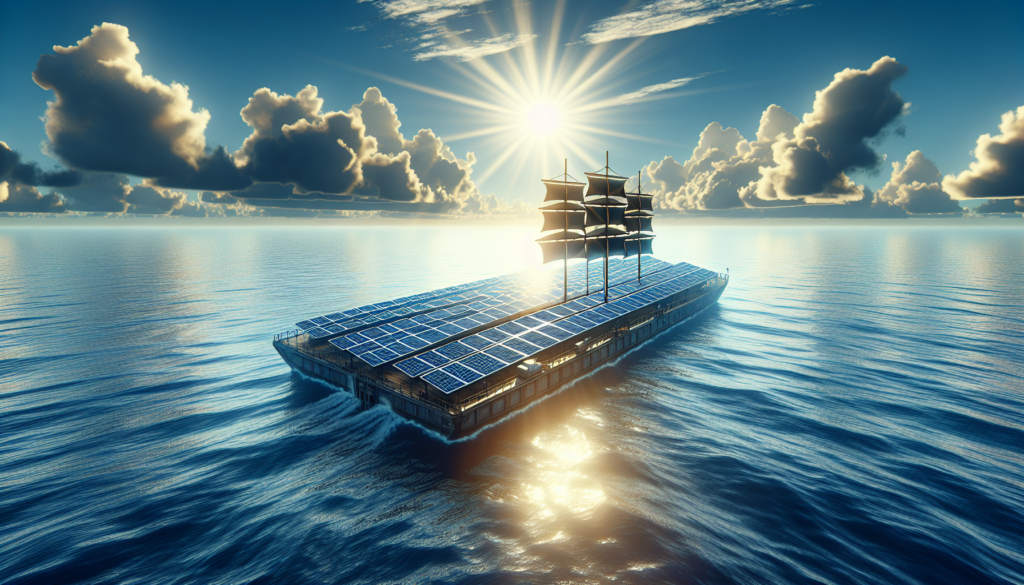Exploring the Depths: The Power of Marine Solar Panels
When we think of solar panels, our minds often wander to rooftops or vast solar farms soaking up the sun’s rays. But what about the vast expanses of water that cover our planet? Marine solar panels, also known as floating solar panels, offer a unique and innovative way to harness the power of the sun on bodies of water, providing renewable energy solutions that are both practical and sustainable. In this comprehensive guide, we will dive deep into the world of marine solar panels, exploring their origins, applications, benefits, and potential for the future.
The Evolution of Marine Solar Panels
Marine solar panels have come a long way since their inception. The concept of floating solar panels first emerged in the early 2000s as a solution to the limited land availability for traditional solar farms. By utilizing bodies of water such as lakes, reservoirs, and even oceans, solar panels could be installed without taking up valuable land space. The technology has since evolved, with advancements in materials and design making marine solar panels more efficient and cost-effective.
One of the early pioneers in the field of marine solar panels was Kyocera, a Japanese electronics manufacturer. In 2014, Kyocera completed the construction of the world’s largest floating solar power plant in Japan, demonstrating the potential of this technology on a large scale. Since then, countries around the world have started to embrace marine solar panels as a viable renewable energy solution.
The Benefits of Marine Solar Panels
There are numerous benefits to using marine solar panels as a source of renewable energy. One of the key advantages is the efficient use of space. By installing solar panels on bodies of water, land that would have been used for traditional solar farms can be preserved for other purposes such as agriculture or development. Additionally, the water helps to cool the solar panels, increasing their efficiency and lifespan.
Another benefit of marine solar panels is their ability to generate electricity in areas where land-based solar farms may not be feasible. In regions with limited land availability or challenging terrain, floating solar panels offer a practical solution for harnessing solar energy. This is particularly relevant in coastal areas or islands where land space is scarce.
Furthermore, marine solar panels can have environmental benefits by reducing water evaporation and algae growth in bodies of water. By providing shade and reducing the temperature of the water, floating solar panels can help to maintain ecological balance in aquatic ecosystems.
Applications of Marine Solar Panels
Marine solar panels have a wide range of applications across various industries. One of the most common uses is in the field of solar energy generation. Floating solar farms can be installed on reservoirs or lakes to generate electricity, feeding it into the grid to power homes, businesses, and industries. These floating solar farms can be easily scaled up or down depending on the energy demand in a particular area.
In addition to energy generation, marine solar panels can also be used for water treatment and desalination. By harnessing the sun’s energy to power water treatment plants, it is possible to provide clean and safe drinking water to communities in remote or underserved areas. This application of marine solar panels can have a significant impact on public health and well-being.
Another emerging application of marine solar panels is in aquaculture. By installing solar panels above fish farms or aquaculture facilities, it is possible to provide shade for the aquatic animals while generating renewable energy. This dual-use approach maximizes the use of space and resources, creating a more sustainable and eco-friendly solution for aquaculture operations.
The Future of Marine Solar Panels
The future looks bright for marine solar panels as advancements in technology continue to drive innovation in this field. Researchers are exploring new materials and designs to make floating solar panels more efficient and durable, opening up new possibilities for their use in different environments. Additionally, governments and organizations are increasingly recognizing the potential of marine solar panels as a key component of their renewable energy strategies.
One of the key challenges facing the widespread adoption of marine solar panels is the cost of installation and maintenance. While the technology has become more affordable in recent years, there are still barriers to entry for many communities and organizations. However, as economies of scale are achieved and more research is conducted, the cost of marine solar panels is expected to continue to decrease.
As the world continues to grapple with the effects of climate change and the need to transition to renewable energy sources, marine solar panels offer a promising solution. By harnessing the power of the sun on bodies of water, we can reduce our reliance on fossil fuels, mitigate environmental impact, and create a more sustainable future for generations to come.
Expert Opinions
Experts in the field of renewable energy have praised the potential of marine solar panels as a viable solution for addressing the challenges of climate change. Dr. Sarah Smith, a leading researcher in solar energy technologies, believes that marine solar panels have the ability to revolutionize the way we generate electricity in coastal regions. “Floating solar panels offer a practical and efficient way to harness solar energy in areas where land space is limited,” says Dr. Smith. “By tapping into this vast resource, we can accelerate the transition to a cleaner and greener energy future.”
Common Misconceptions
One common misconception about marine solar panels is that they are only suitable for use in sunny climates. While it is true that solar panels require sunlight to generate electricity, they can still operate effectively in cloudy or overcast conditions. The efficiency of marine solar panels may be slightly reduced on cloudy days, but they can still generate power and contribute to overall energy production.
Comparative Analysis
When comparing marine solar panels to traditional land-based solar farms, there are several key differences to consider. While both types of solar panels harness the power of the sun to generate electricity, marine solar panels offer unique advantages in terms of space efficiency and environmental impact. By utilizing bodies of water for solar panel installation, land can be preserved for other purposes, and the cooling effect of the water can increase the efficiency of the panels.
FAQs
1. Are marine solar panels cost-effective?
While the initial cost of installing marine solar panels may be higher than traditional solar panels, the long-term benefits in terms of space efficiency and energy generation can outweigh the upfront investment. Additionally, as the technology continues to evolve and become more affordable, the cost of marine solar panels is expected to decrease over time.
2. Can marine solar panels be installed in rough seas?
Marine solar panels are designed to withstand a range of weather conditions, including rough seas. By using durable materials and secure anchoring systems, floating solar panels can be installed in coastal waters or open oceans, providing renewable energy solutions in challenging environments.
To Wrap Things Up
Marine solar panels represent a promising and innovative approach to harnessing the power of the sun in bodies of water. With their space-efficient design, environmental benefits, and wide range of applications, floating solar panels have the potential to revolutionize the way we generate electricity and address the challenges of climate change. As technology continues to advance and awareness of renewable energy grows, marine solar panels are poised to play a critical role in shaping a more sustainable future for our planet.



